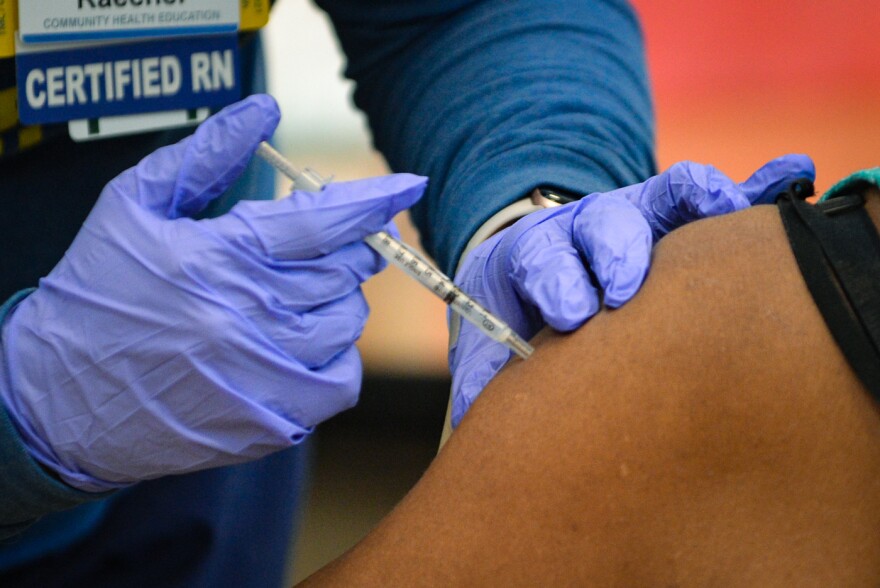Lee este reporte en español.
After a brief spike in September, Kansas City flu and COVID-19 levels are low right now. But city health officials say they are still contending with confusing federal vaccine messaging, which is leading to increased uncertainty.
It stems most recently from a decision this month by the Centers for Disease Control and Prevention to downgrade COVID-19 vaccine recommendations and effectively eliminate the combination measles and chickenpox vaccine for young children. CDC officials also urged manufacturers to develop individual replacement vaccines for the combined measles, mumps and rubella shot.
Health experts warn splitting these vaccines up would mean more needles in arms and more doctor visits — a barrier that could lead to lower vaccination rates.
Kansas City Health Director Dr. Marvia Jones said that’s already an issue in some parts of the city.
“When many people start making that same decision to wait, not only do they put their own families at risk, but they also put other families and young children at risk,” she said.
This increased hesitancy, fueled in part by new and sometimes unclear federal instructions, is leading to increased case counts of some illnesses, Jones said.
So far this year, the Kansas City Health Department has recorded 75 cases of whooping cough, also known as pertussis. That’s the highest total in recent years for the illness, which can cause uncontrollable coughing and difficulties breathing.
Jones said the majority of whooping cough cases this year are in unvaccinated children and people who live with them. She said it's a reminder that these preventable illnesses can return when vaccination reports drop.
“If you have questions or concerns about these vaccines, talk to another health care practitioner,” Jones said. “Don’t let things you’re hearing away from trained professionals sway those decisions.”
Last week, Jones co-signed a letter from the Big Cities Health Coalition that expresses support for vaccination, in direct response to concerns the federal government is limiting access and causing doubts. In the letter, two dozen public health leaders said changes to recommended immunization schedules are limiting access to vaccines.
“Vaccines have eradicated devastating diseases and saved millions of lives. They keep classrooms safe and schools open,” the coalition wrote. “With respiratory virus season rapidly approaching, we strongly encourage all Americans to tune out the political noise about vaccines.”

The past year has been full of political changes to vaccine protocols. In May, the CDC stopped recommending the annual vaccine for children and pregnant women. In August, the FDA pulled the Pfizer vaccine's emergency use authorization, the only option for children under 5 that does not require an pre-existing condition.
Jackson County Assistant Health Director Ray Dlugolecki said, when the CDC and other federal entities are slow in the rollout of vaccine recommendations, a domino effect slows the entire process down — all the way to local governments.
“The first domino falls in early February and the rest of the year follows,” he said. “This year, in some cases of ideological opposition to vaccines in general, key parts of that process were missing or recommendations didn’t arrive until much later.”
That leaves Jackson County unable to review those recommendations and get the right vaccines out to the right people at the right time. Luckily, most health departments say they were able to get the necessary supplies this year and have vaccines available to people in need.
Still, Dlugolecki encouraged people to get vaccinated now. He said COVID-19 vaccines offer anywhere from 30% to 60% additional protection against severe illness, and the RSV vaccines offer up to 90% protection.
Changes in government vaccine recommendations are not just an issue in Missouri, either. Johnson County Health Director Charlie Hunt believes Kansas’ most populous county is on track for people to start getting vaccinated, but said it’s hard to gauge demand for COVID-19 in particular because the vaccine hasn’t been widely available.
“I think the advisory committee coming out so late is going to have some impact on vaccine uptake, and the messaging around it has become complicated,” Hunt said. “It used to be licensed for everyone 6 months and older, but now there’s language about qualifying conditions and consultation with a physician.”
Hunt said his department does have the vaccine now, and cases are actually trending down in Johnson County. But Hunt expects that to change in the next month as people travel for the Thanksgiving holiday.
While federal messaging is inconsistent, local officials are striving for uniformity.
Anila Deliu, planning and policy lead at the Clay County Public Health Center, said the message they send out continues to be that vaccines are the best defense against serious illness and hospitalization.
So far, Deliu says, it’s working.
“As far as vaccine uptake for flu and RSV immunizations, we are pretty much consistent with the 2024 levels at this point in the respiratory season,” Deliu said.







